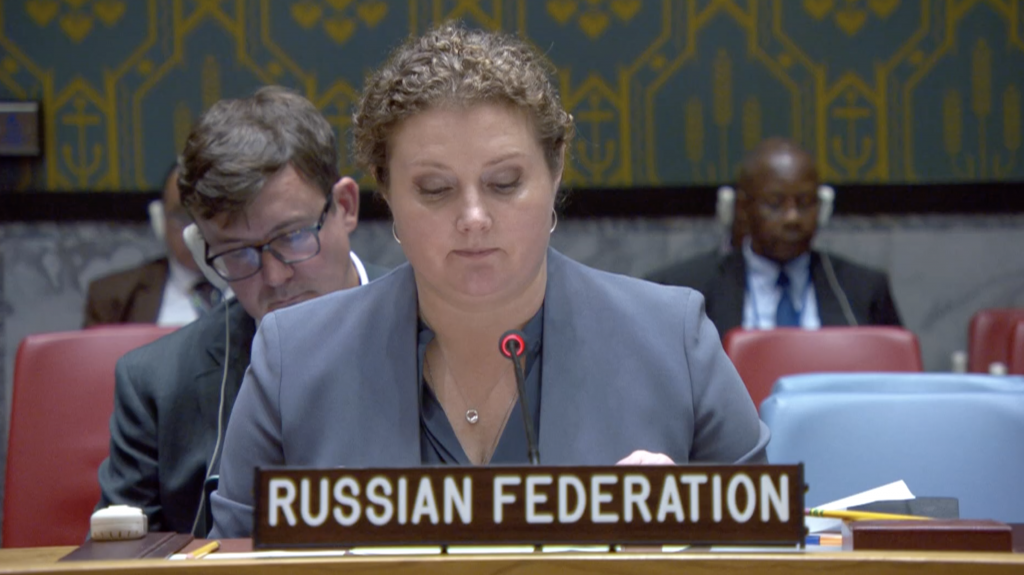Statement by Deputy Permanent Representative Anna Evstigneeva at UNSC briefing on the situation in Sudan
Mr. President,
We thank OCHA Operations Director Edem Wosornu and Chair of 1591 Sanctions Committee, Permanent Representative of Ghana to the UN, Ambassador Agyeman for the briefings. We also listened to the remarks of SRSG Perthes and a civil society representative from Sudan.
At the outset, I would like to express our regret that Sudan is not taking part in this quarterly briefing. Some members of the Council chose to escalate the situation by forcing our Sudanese colleagues to withdraw from this discussion. The implications of that step for the future work of the Security Council on the Sudanese file are of serious concern.
Meanwhile, the situation in Sudan remains extremely tense. Over the past months since April 15, hostilities have spread over a large part of the country, causing numerous casualties and widespread destruction of infrastructure. The country is virtually on the brink of a humanitarian disaster. Outbreaks of inter-ethnic violence and grave crimes against civilians are reported to take place in a number of regions, including Darfur. The total number of refugees and internally displaced persons already exceeds 5 million. Unfortunately, the conflict becomes protracted.
Mr.President,
The Russian Federation has consistently advocated a peaceful resolution of the Sudanese crisis with absolute respect for the unity, sovereignty, independence and territorial integrity of the country. We continue to call on the Sudanese parties to demonstrate political will and take immediate steps to end the armed confrontation.
We support international and regional initiatives for mediation that are aimed at finding political and diplomatic solutions and that have the confidence of the Sudanese. We see good potential in the ministerial working mechanism to facilitate a Sudanese settlement (established following summit of Sudan’s neighbors that convened on 13 July in Cairo), the next meeting of which is scheduled for next week in New York. The first meeting of the mechanism in N'Djamena on 7 August identified the key areas of the mechanism’s work, which we believe correctly reflect the priorities for the current stage. Among them are early cessation of hostilities, launch of a broad inter-Sudanese dialogue and resolution of humanitarian problems. The road map promoted by the Sudanese authorities to normalize the military and political situation in the country pursues the same objectives. We advocate closer conjugation of efforts by external stakeholders and official Khartoum in order to achieve tangible results at the settlement track. We oppose any attempts to use the mediation efforts of regionals and neighboring states for geopolitical purposes. The main task now is to stabilize the country and preserve its state institutions.
Foreign interference in Sudan’s sovereign affairs in order to impose some kind of "democratizer" schemes and non-inclusive solutions is inadmissible. We believe that it was the external pressure on the Sudanese leadership exerted by certain Western states who demanded untimely and unprepared reforms that contributed to the aggravation of the internal political crisis in the country. Unfortunately, the leadership of the United Nations Transition Assistance Mission in Sudan (UNITAMS) adopted a similar approach. Not surprisingly, the Sudanese authorities declared the head of UNITAMS, Mr. Volker Perthes, an undesirable person.
Mr.President,
We presume that the Security Council should respect the sovereign decisions of the government of Sudan regarding the special political mission deployed at the request of the host country under Chapter VI of the UN Charter. The current situation with the loss of confidence in the leadership of UNITAMS does not allow the UN to fully implement its mandate. We would like to emphasize that this situation did not arise overnight. Confidence in UNITAMS has been eroded for many months, and the Mission has not carried out all the tasks entrusted to it, including tasks that the Sudanese considered as priorities. The work in the area of political settlement was discordant. Questions as regards the bias of mediation arose from across the political spectrum, which ultimately led to a complete collapse of mediation. Finally, we are confident that even after May 2023, when the situation came to the surface, a responsible solution could have been found that would have confirmed the UN's reputation as an honest broker and put the interests of the Sudanese people first, especially at the current stage and in the context of this unprecedented crisis. We also noticed the destructive influence of a number of Security Council members who provoked further escalation of disputes between Khartoum and the United Nations.
We trust that, no matter how the dialogue between Sudan and the United Nations develops in the future, the Organization will continue its crucial work in providing humanitarian assistance to Sudan and its neighbors who are exposed to the consequences of the crisis. Moreover, such efforts must step up.
Against the backdrop of current developments, we see no need to expand the UN Security Council sanctions regime beyond the existing parameters with a focus on the Darfur region. As a matter of principle, we always oppose imposition of illegitimate unilateral restrictions, which Western countries use as a punitive tool to secure their interests. It is obvious that Western pressure and blackmail with economic assistance do not work in Sudan or elsewhere in the world.
Mr.President,
In conclusion, we would like to reaffirm Russia's unwavering readiness to continue to assist friendly Sudan in overcoming the current difficulties and returning to the path of peace and sustainable development.
Thank you.
